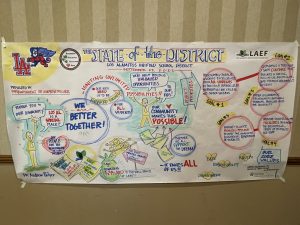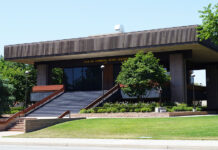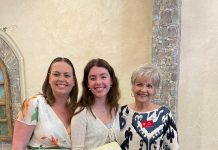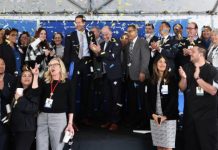
In an hour-long State of the District address on September 23, the superintendent of the Los Alamitos Unified School District painted a picture of a forward-focused school system that has leaned into a rapidly evolving educational environment to create better outcomes for the 9,000 students at its nine campuses across Los Alamitos, Rossmoor, and Seal Beach.
“We’ve been very cautious to not want to necessarily change,” Andrew Pulver, Ed.D., said to a room packed with educators, parents, administrators, and school district partners.
“But as we look at the last few years, as we’ve come out of this pandemic, we also know it is critical that we be forward-focused and that our kids remain forward-focused,” said Pulver. Students’ growing mental health needs and a focus on addressing their social and emotional health have become a major factor in education, he said, and the district simply must adapt.
“Our schools must work for all kids, not just some kids,” said Pulver at the annual event, which is sponsored by the district’s nonprofit partner, the Los Alamitos Educational Foundation and was again held at On the Greens at the Navy Golf Course in Cypress.
Pulver noted that the district’s implementation of the Stanford University-affiliated program Challenge Success has, among other suggestions, made it clear that “a solution is to really embrace a broader definition of success by transforming the student experience.”

Dr. Pulver’s speech is represented in an illustration by artist Michelle Boos-Stone.
Challenge Success surveyed the district’s 6th through 12th graders and found that 95% reported being sleep deprived, 77% were experiencing stress-related health symptoms and 63% were constantly worried about academics.
“I think this is what we have to be about,” the superintendent said. “We believe that all students are valued in their own interest. That they shouldn’t have to choose between doing well and being well.”
Pulver’s metaphor for students’ experiences was the weight of a glass full of water; his point illustrated in a video he shared.
In the video, a man holding a glass full of water asks students in a classroom, “How much does it weigh?” At first, he said, there was no problem holding firm the glass of water with arm extended.
However, if one were forced to hold it for hours, like a full day, he said, the water-filled glass would soon feel heavier and heavier with each passing hour until the weight was no longer bearable.
Pulver then asked the audience to imagine a student with a stressor in their life forced to hold it inside without relief all day, every day. Pretty soon, the weight would impair their ability to learn.
“You can start thinking about the students [carrying burdens] all day long,” he said, “you’re paralyzed, incapable of doing anything.”
“How do we put this glass down?” Pulver asked the crowd.
To retain its vaulted position, Pulver suggested the district must quickly accelerate its ability to adapt to social realities that have left many students needing “safe spaces” to learn.
“It’s really all about creating thriving relationships,” he said.
Make no mistake, however, said Pulver, the district’s improved educational environment will not only retain its top tier rankings in state and national educational results, but the district cannot afford the risk of not creating an environment where all students can excel.
Thus, the superintendent announced a thematic change from its most recent “better together” motto to the “forward-focused” approach to educating students, designed to meet the post-pandemic moment.
“I think it was so fitting that we had this mantra of being ‘better together,’” said Pulver, “and that we could not have gone through what we went through without really all of us uniting collectively.”
However, “there is a critical need now in that same space of going a little deeper and wider, just like our teachers do every year,” he said.
The superintendent also sent a message to parents demanding the system remain focused only on the basics of reading, writing and arithmetic as part of the Los Alamitos educational experience.
“You know, from some in the community, what we’ve heard is, ‘I don’t understand why they’re [schools] focusing on social-emotional learning, and why are they focusing on wellness of kids, etc.,’” said Pulver.
Pulver suggested there is overwhelming evidence to focus on the whole child when it comes to educating students. He laid out his “blueprint,” calling it a “big, bold vision” that he said will only “enhance” the educational strength of the Los Alamitos Unified School District.
“I think all of us in this room are charged with doing this work,” he said. “We are here to serve and support the needs of our families and the dreams that our families have for their kids.”
“It’s really one mission, and that is to create the very best educational opportunities and experiences for our students,” said Pulver, thanking the Board of Education for “really being thoughtful” about the smart investments they’ve made to the district.
Diana Hill, President of the Los Al Unified Board of Education said, “this is a very special opportunity among a very special group of people. What makes Los Al Unified special is all of you,” she said.
“Whether you are on staff, whether you’re a teacher, whether you’re a volunteer, a parent community member or whatever, you do make a difference,” said Hill, thanking everyone in the room for their contributions to the system.
She also thanked Carrie Logue, Executive Director of LAEF and LAEF employees for the “incredible support” the nonprofit gives to the district. LAEF sponsors the State of the District annual event and has been instrumental in several educational initiatives, including the new mental health-related Well Spaces.
On Friday, Logue and LAEF’s new Board President, Felicia Gonzalez, presented a check for $245,000 to build a new Well Space at Los Alamitos High School.
In addition, LAEF has also contributed $3,000 to each of the district’s six elementary schools to create mini–Well Spaces on their campuses. Los Al Unified, along with LAEF, collaborated with the Orange County Department of Education and Children’s Hospital of Orange County (CHOC) to establish Well Spaces now open at the district’s two middle schools, the superintendent said.
“We are proud to enhance the district’s educational excellence,” said Logue, noting that the nonprofit educational partner of the system is well known for its after-school and summer enrichment programs.
She said LAEF’s fundraising involvement has grown to other programs.
Logue announced that LAEF’s free elementary world language classes are now available to 1st graders through 5th graders throughout the district, with approximately 350 students already enrolled.
LAEF has also donated more than $400,000 to the district to support various STEAM (Science, Technology, Engineering, Arts and Math) programs, she said, thanking local business sponsors for their support.
Logue also recognized Dave Appling, who she said in the 1980’s organized fundraisers that “raised millions, literally millions” to support the district.
Currently, she said, since mental health has been declared a “national emergency,” LAEF was working closely with Los Al Unified to raise funds to meet the growing challenge.
“We really made mental health a priority in our funding,” she said.
Pulver too, thanked LAEF, and said the district’s school and mental health counseling ranks have been beefed up so that each of the system’s 9,000 students will have access to a counselor, if needed.
“The goal here is obviously to increase student wellbeing so they’re more able to engage and have the sense of belonging,” he said.
Although the district was among the first in Orange County to get kids back into the classroom during the pandemic, Pulver hinted the system’s herculean effort may have not been enough to hold off some learning loss.
Those results will be reflected when recent standardized testing results are released, which is now expected in October.
“We do recognize that we went through a pandemic and so we have to stay focused forward for our kids in that process,” said Pulver.
“You need to hold us accountable,” he added. “We need to hold ourselves accountable to these metrics,” said Pulver, ensuring that “what we say and what we do, are aligned to what was actually happening within our school system.”
The superintendent said the district nonetheless continues to produce educational results of “national caliber.”
“We had two schools that were National Blue-Ribbon winners, the only district in the state of California that have two Blue Ribbon Schools, one in each category, which is high performing and closing the achievement gap, which is really, I think, something spectacular.”
“We have had 75 Division One scholar athletes just in the last five years, that is a huge thing,” the superintendent said. “Our elementary schools continue to be … known for constantly being ranked in the top in the county,” he added.
Approximately 92% of Los Al students enroll in some form of post-secondary education, said Pulver, acknowledging of course that student achievement remains essential to the community.
Finally, Pulver gave a brief overview of the state-of-the-art facilities that now grace the district’s nine schools, courtesy of a $225 million combined investment provided by Measure K and Measure G bonds.
Part of that includes a $67 million STEM building and Aquatic Complex on the campus of Los Alamitos High School as well as plans to build a second gymnasium at LAHS.
Within the STEM building are significant career technical facilities where students can get hands-on experience to learn critical thinking skills as the district continues to broaden its career technical educational pathways as well, he said.
This year alone, he said, new medical and biomedical pathways are being added.
Pulver said many of the changes are based on a “Project Based Learning,” concept, an emerging framework that uses alternative or authentic assessments to create a climate of care and education for the whole community.
Recent changes in homework policy were indeed a part of this new framework, said Pulver.
“We have to get rid of this notion that we’re all about the academics,” said Pulver, saying “safe spaces” to learn will only elevate the district’s standards of educational excellence, suggesting you can no longer have one without the other.
Students, he said, “are going to remember the connections they made with other kids, the connections they made with adults in the classroom. That’s going to be their legacy.”
“If we don’t treat kids well, if we simply are all about wanting to be number one, and if being number one comes at the expense of kids being well, we have failed,” said Pulver.
“At the end of a semester, we all fall prey to this when we’re constantly asking people what grades did they get, what college did you get into, etc.,” he continued.
“I want to say this again,” emphasized Pulver, “our kids should not have to be focused on one, or the other, they should be able to do well and be well.”
“Success,” he said, “is really measured over the course of a lifetime,” suggesting that only a forward focused system can fully deliver to each student the same opportunity to succeed.











